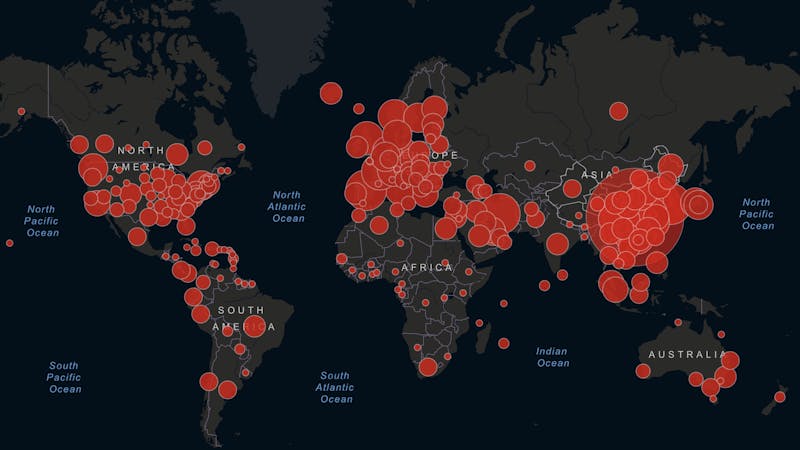Coronavirus: are you at higher risk of complications?
Many of Diet Doctor’s loyal followers have come to our site precisely because they have the conditions currently raised as possible risk factors: diabetes, high blood pressure, cardiovascular disease, and other metabolic issues.
But what exactly do we know about the degree of risk, and what conditions count as “underlying health problems”?
While there’s still much we don’t know, we’ll summarize what we do know from the best available evidence. This will help you understand if you’re at risk and, more importantly, what you can do to protect yourself.
What’s the risk of severe illness?
This is a tough question to answer. As Professor John Ioannidis from Stanford University pointed out in his controversial editorial, we’re dealing with limited data. While many may disagree with his conclusions regarding preventive practices, his point about needing more data is clear.
Some sources, such as the World Health Organization, list the death rate from COVD-19 as 3.4%. However, other reports from mainland China published in the New England Journal of Medicine suggest the mortality rate is closer to 1%.
And, according to Professor Ioannidis, if we use data from the Diamond Princess cruise ship, the mortality rate was 1% in a predominately elderly, high-risk population. Extrapolating that data to the population as a whole would result in a mortality rate between 0.025% and 0.625%. However, given the limited data, this is mostly conjecture on his part without firm scientific support.
Other data suggests 81% of all cases are mild, 14% severe, and 5% critical, with a 15% mortality risk for those over 80 years old and 8% for those over age 70.
In the end, without widespread testing, we won’t know exactly what the mortality rate is. That is frustrating and understandably anxiety-provoking for many.
However, we do know who may be at higher risk for complications, as we describe below. This isn’t meant to scare you, but to inform you so you can take preventive actions that may protect you and your loved ones.
Prevention is key
Being older or having underlying medical conditions doesn’t mean you are more likely to contract the virus. It means you are more likely to suffer severe complications if you do get the virus. Therefore, aggressive prevention measures are vitally important to help prevent you from getting the infection in the first place.
What may set this pandemic apart from others is the ease at which the virus is transmitted. People without any symptoms may be spreading the virus. While this reduces the rate of mortality among the general population, it does mean there is the risk of widespread infections, which can mean overwhelming the healthcare system with severe cases, as is happening in Italy.
People who would normally be treated and returned to full health by timely and effective health care treatments may be unable to access the right care because the system itself is overburdened.
That’s why “flattening the curve” with social distancing is so important, so that not too many people at one time develop severe symptoms that need ventilators or ICU support, which are in limited supply.
We all have a part in combating this pandemic, and we especially have a duty to help protect those at increased risk.
The first key to prevention is social distancing. If you aren’t around others who may have the virus, your chances of getting it are much lower. Dr. Andreas Eenfeldt wrote a very well received post about the importance of social distancing and what we need to do now to help protect those at risk and “flatten the curve” of the disease. Please refer to that article for more details on prevention.
An important point about the movement to “flatten the curve” is that it can have two distinct benefits.
First, it can reduce the chance of becoming infected, but also, it can protect the healthcare system from becoming overwhelmed. As we have unfortunately learned from the experience in China and Italy, this infection can quickly spread and suddenly create more sick people than the healthcare system is equipped to effectively treat.
In the epicenter in China, the mortality risk was 12%, whereas outside that area it was closer to 1%. One real possibility is that the difference was due mostly to the quickly overwhelmed healthcare system at the epicenter (although testing methods can also explain the difference).
In Italy, the lack of ICU beds and mechanical ventilators created a health care crisis. This not only put those with severe infections at risk, but it also compromised the care of other patients with heart attacks, strokes, or even motor vehicle accidents.
By protecting our health care system, we protect all citizens.
Prevention depends on all of us.
What defines “underlying health problems?”
According to a study reviewing the coronavirus outbreak in Wuhan, China, the most common health conditions in those with more severe disease, in order of occurrence, have been:
Another study comparing those who died from the disease found the same associations. While this is not an all-inclusive list, it seems to be consistent that these are the top concerning conditions defining a higher risk.
The other increased risk is, of course, increasing age. This appears to be true regardless of the presence or absence of underlying health conditions. Those who are elderly and have underlying health conditions are likely at the highest risk of all.
This could be due to age-related decline in immune function or perhaps less reserve to recover from a severe illness. While you can’t control or reverse your age (many have tried!), you can prioritize your health to minimize your risk, and you can practice heightened prevention techniques to hopefully reduce your chance of contracting the virus.
There is some good news for older adults: 85% of those who are age 80 and older who get the coronavirus will recover.
High blood pressure and risk of COVID-19
Somewhat surprisingly, high blood pressure (hypertension) appears to be the leading underlying health issue for those who develop severe coronavirus infections. The study published in The Lancet reported that 30% of patients with severe disease and 48% who died had hypertension.
High blood pressure is not traditionally thought of as increasing risk for viral infections or infectious complications, but that doesn’t seem to be the case with this coronavirus. One hypothesis is that it might have more to do with the medications that treat hypertension than the underlying disease. The virus appears to bind to an enzyme called ACE2.
Popular blood pressure medications called ACE-Inhibitors and angiotensin receptor blockers (ARBs) can elevate the levels of ACE2. However, there is no convincing data that those taking these medications are at higher risk (drug treatment data was not included in the initial data).
Right now, official recommendations are to not stop any blood pressure medication without discussing it with your physician first. However, others are concerned that since both patients with diabetes and hypertension may be taking ACE-inhibitors, we may be missing an important piece of the puzzle. This may be a moving target with more information coming in the near future.
In addition, it’s difficult to control the data for age, heart disease, congestive heart failure, and other conditions that go along with high blood pressure. Therefore it’s not clear what the main mechanism is for increased risk. It’s hard to give an evidence-based recommendation in the absence of better data.
However, it makes sense that now is not the time to stop medications or neglect healthy lifestyle habits, as that may worsen control of your blood pressure. Instead, now is the time to make sure you do everything you can to control your blood pressure.
You can read our guide on lowering blood pressure naturally for more tips on controlling and reversing hypertension.
Diabetes and risk of COVID-19
Diabetes is the second most common condition associated with severe coronavirus cases and deaths. Most studies did not differentiate between type 1 and type 2 diabetes, but given that type 2 diabetes makes up over 90% of all diabetes cases and the fact that most patients were older, we can assume the majority of complications were in patients with type 2 diabetes.
We know from prior data that elevated blood sugar predisposes people to risk of infections after surgery or to diabetic ulcers. Elevated blood sugars also directly impair the functioning of immune cells. So, it is possible that the increased risk from diabetes has to do with poor glycemic control leading up to the infection. In fact, during the SARS epidemic in 2003, blood glucose levels were an independent risk factor for dying.
Does that mean someone with a diagnosis of diabetes who has good control of their blood sugars is at less of a risk? We simply don’t have the data yet. But it certainly makes sense that now is a very important time to ensure your blood sugars are as stable as possible, especially for those with both type 1 and type 2 diabetes.
While many promote medications such as insulin for blood sugar control, numerous studies show that low-carb nutrition is one of the most powerful ways of controlling blood sugar and even reversing type 2 diabetes. Learn more in our numerous guides and videos on using low-carb to manage blood sugar and keep it in a healthy, normal range as much as possible.
Learn more
- How to reverse type 2 diabetes naturally
- The Diabetes Diet: The best foods to control diabetes
- Starting low-carb or keto with diabetes medications
- Podcast with Dr. Jake Kushner on managing type 1 diabetes
- Podcast with Dr. Sarah Hallberg on treating type 2 diabetes with a keto diet
Heart disease and risk of COVID-19
The Lancet study also showed that cardiovascular disease (CVD), i.e heart disease, was the third most common condition associated with a worse COVID-19 outcome. This could be simply because CVD is commonly associated with older age, diabetes, and high blood pressure. It could also be because one complication of a severe coronavirus infection appears to be an acute cardiac injury.
If someone already has a compromised cardiac function and suffers this complication, their heart and overall health may be less likely to overcome the infection and recover.
Again, the key is recognizing the increased risk, implementing proper preventive measures, and doing your best to control anything that worsens cardiovascular risk such as high blood pressure, chronic inflammation, and poor blood sugar control.
Lung disease
Since lung complications such as bilateral interstitial pneumonia and acute respiratory distress syndrome (ARDS) are the most common presentations for severe COVID-19, it makes sense that those with compromised lung function would be at higher risk for complications and death.
So far, as listed in the Lancet study, pre-existing lung disease has not been one of the more common conditions associated with poor outcomes with COVID-19, but it was identified as a risk in a coronavirus report from the International Journal of Infectious Disease.
While we have limited data, to reduce any potential lung problems, it makes sense to avoid tobacco smoke and even vaping. Immediately stopping lung irritants like tobacco won’t undo prior damage, but it may prevent further damage.
Pre-existing immune conditions
Autoimmune diseases such as psoriasis, rheumatoid arthritis, lupus, and others conditions may also present an increased risk from coronavirus infections.
It isn’t yet clear if this could be from the disease itself or the immunosuppressive drugs taken for many of these conditions. In fact, some experts even claim there may be a potential benefit from specific immunosuppressive medications, as they may limit the over-reaction from a patient’s immune system that can lead to COVID-19 complications. While there is no data yet for this stance, it highlights the variety of opinions and shows that we need more solid data.
Those who take immunosuppressive medications should not stop their medications out of concern for coronavirus. Transplant recipients, cancer patients, and others depend on their immune suppressing medications. If you have a condition that may impact your immune response to infection, please do not change or stop your medication without discussing it with your doctor first.
Keeping as healthy as possible is important. But unfortunately, there aren’t many reliable, evidence-based approaches to “boosting” your immune system. You can read more about what is known now in our guide on boosting your immune system.
The bottom line for those who are immunosuppressed is that you need even greater attention to preventive measures such as social distancing, hand washing, maintaining proper nutrition, and getting restorative sleep.
In the end, are you at risk for complications from this new coronavirus? Unfortunately, more than half of the entire US population may have conditions that place them at increased risk.
That is why now is the time for all of us to prioritize our health, our lifestyles, our self-care, and our care for others. We can minimize the spread of the coronavirus. We can and will get through this, together.
More
Did you enjoy this guide?
We hope so. We want to take this opportunity to mention that Diet Doctor takes no money from ads, industry or product sales. Our revenues come solely from members who want to support our purpose of empowering people everywhere to dramatically improve their health.
Will you consider joining us as a member as we pursue our mission to make low carb simple?



